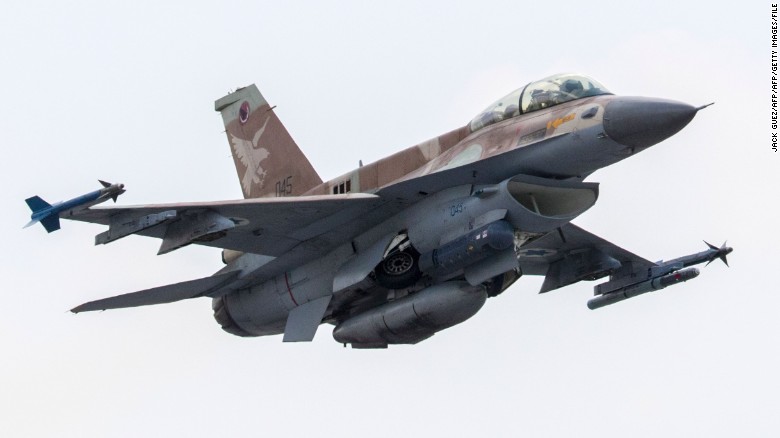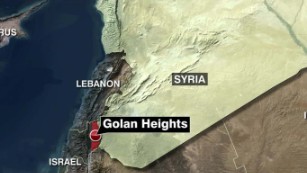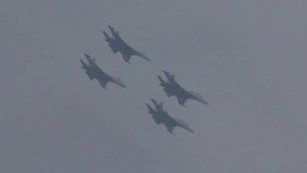CNN

Story highlights
- Syria says strikes targeted military site near Palmyra
- Israeli jets make incursions inside Syria, but IDF rarely confirms it
Jerusalem (CNN)In
the most serious clash between Israeli and Syrian forces since the
start of the Syrian conflict six year ago, Israeli aircraft struck
several targets in Syria overnight, the Israeli military said Friday.
Israel targeted a military site near the ancient city of Palmyra, the Syrian military said, in what would be one of its deepest airstrikes inside Syrian territory since the civil war began there.
Palmyra,
once held by ISIS and retaken by the Syrian government, is
strategically important to both the regime and its opponents.
Most
of Israel's reported strikes have been around the capital of Damascus,
about 60 kilometers (37 miles) from the Israeli-occupied Golan Heights.
In
response, Syrian forces fired anti-aircraft missiles at the Israeli
jets, saying they downed one aircraft and hit another. Israeli
vehemently denied the assertions, calling them "absolutely not true."
"At no point was the safety
of Israeli civilians or the IAF aircraft compromised," a statement from
the Israel Defense Forces said. The statement is unusual in that Israel
rarely comments on airstrikes in Syria.
The
intercept triggered alarm sirens in the Jordan Valley. Shrapnel from
the explosion, which was heard as far south as Jerusalem, landed in
western Jordan, the Jordanian military said.
Syria's
latest claims are reminiscent of its statement in September about
downing an Israeli aircraft near Quneitra, close to the Golan Heights. Israel seized parts of that region from Syria in the 1967 Six Day War.
The
Israeli military said then that Syria fired two anti-aircraft missiles
at its jets targeting artillery positions, but both missiles missed.
They were fired long after Israeli jets left the area, the military
added.
Arrow missile defense
One of the missiles overnight was intercepted by Israel's Arrow missile defense system, marking its first operational use. Arrow, Israel's ballistic missile defense system and the long-range version of its Iron Dome, is designed to intercept missiles outside the atmosphere.
The
use came more than a year after the first successful Arrow-3 intercept
test was carried out in December 2015. At that time, Israeli officials
would not say when the missile would become operational.
The
Israeli military would not explain why Arrow was used against an
anti-aircraft missile, fueling speculation that Israel was either
testing the Arrow missile or that its Iron Dome missile defense system
wasn't within range of downing the anti-aircraft missile.
Taking aim at weapons smuggling
Israel has long focused on stopping the transfer of weapons from Syria to terror groups.
In December, Israeli Defense Minister Avigdor Liberman
told a delegation of European Union envoys that Israel will "prevent
the smuggling of sophisticated weapons, military equipment and weapons
of mass destruction from Syria to Hezbollah."
It
was another acknowledgement of Israel's ongoing operations in Syria.
Last April, Prime Minister Benjamin Netanyahu confirmed that Israel has
struck Syria "dozens of times," breaking with the policy of remaining
quiet about involvement in its war-torn northern neighbor.
Netanyahu
returned last week from Moscow, where he reaffirmed Israel's military
coordination with Russia in the skies over Syria. The two countries
established the coordination last year to avoid conflicts in Syrian
airspace, ostensibly to allow both countries to operate freely.
Netanyahu also expressed his concerns about a growing Iranian presence
in Syria.
Repeated incursions
Israel
has attempted to stay out of Syria's civil war but has reportedly
struck the country multiple times in the past, often taking aim at
weapons shipments intended for Hezbollah in Lebanon.
As recently as late February, Syrian media reported that Israeli jets hit military positions and weapons convoys near Damascus.
In
November 2012, Israel fired warning shots toward Syria after a mortar
shell hit an Israeli military post, the first time Israel had fired on
Syria across the Golan Heights since the 1973 Yom Kippur War.
Israeli jets have been hitting targets in Syria since at least 2013, when US officials told CNN they believed IDF jets had struck nside Syrian territory.
In 2014, the Syrian government and an opposition group both said an IDF strike had hit Damascus' suburbs and airport.
The
state-run Syrian Arab News Agency characterized those strikes as "a
flagrant attack on Syria, targeting two safe areas in (the) Damascus
countryside in Dimas and near Damascus International Airport."
Israeli
strikes have also gone after ISIS fighters inside Syria. Late last
year, IDF troops operating in the disputed Golan region came under fire
from militants of the ISIS affiliate Khalid ibn al-Walid Army, Israeli
military spokesman Lt. Col. Peter Lerner said.
The soldiers fired back, triggering an exchange of gunfire. A subsequent Israeli airstrike destroyed a vehicle carrying four militants, Lerner said.






No comments:
Post a Comment